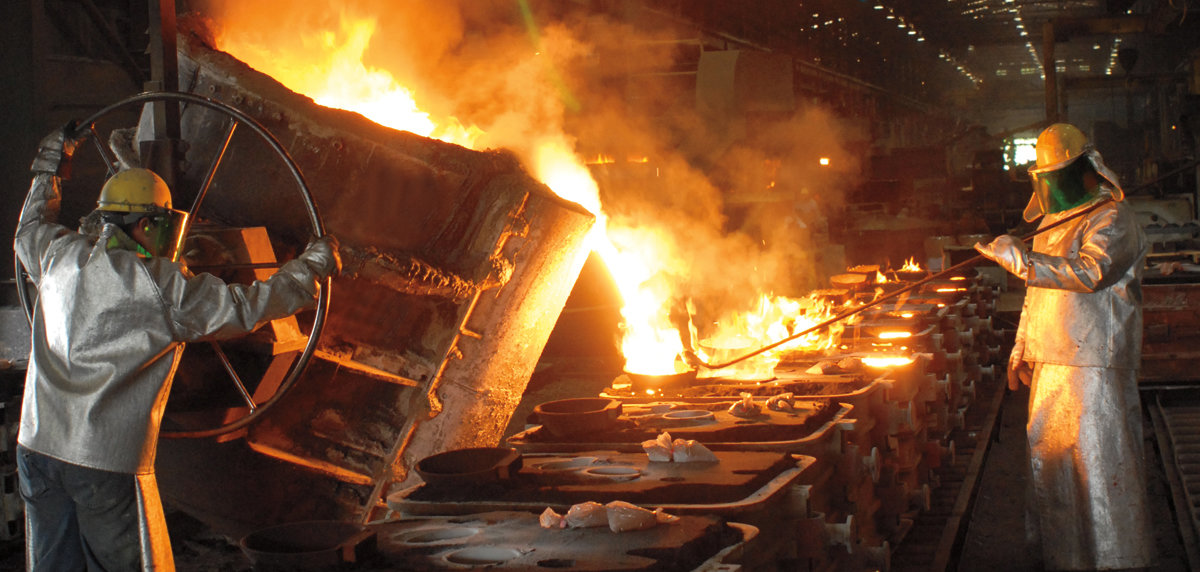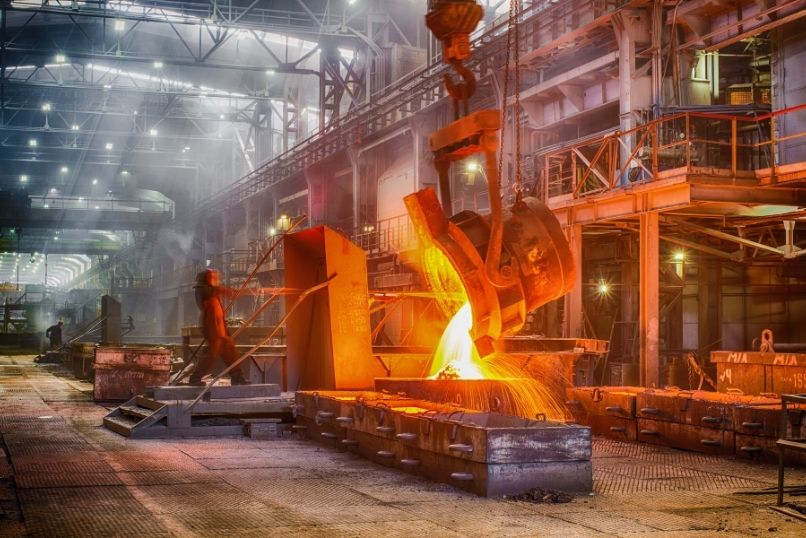The growing demand for green solutions in Aluminum Foundry workflows
Wiki Article
A Deep Study Steel Foundries: Key Providers and Their Effect On Production
Metal factories are indispensable to modern manufacturing, using vital services that form the production landscape. They specialize in various casting procedures, ensuring precision and high quality in steel elements. The development of technology and lasting methods has even more influenced their operations. As industries progressively rely upon these foundries, comprehending their vital solutions and the ramifications for manufacturing performance comes to be crucial. What difficulties and technologies exist ahead for this crucial field?Recognizing Steel Casting Processes
Steel spreading processes transform fluid steel into strong things with different strategies, each customized to details applications and materials. Among the most common methods are sand casting, financial investment casting, and pass away casting, each offering distinct advantages. Sand casting utilizes a mold and mildew constructed from sand, enabling the manufacturing of huge parts at a reasonably low price. Financial investment casting, on the other hand, includes developing a wax pattern that is coated in ceramic, generating intricate and very thorough shapes. Pass away casting utilizes high stress to compel liquified metal into a mold, which is excellent for mass production of little, exact parts. These procedures permit a vast array of metals to be made use of, including steel, light weight aluminum, and bronze, accommodating diverse commercial needs. The choice of a suitable spreading technique depends upon variables such as required resistances, manufacturing volume, and product residential or commercial properties, influencing the general performance and effectiveness of the end products.The Significance of Accuracy Spreading
Precision casting plays an essential duty in creating parts that require high precision and elaborate details. This method, frequently described as financial investment spreading, permits tight resistances and complicated geometries, making it crucial in markets such as aerospace, auto, and medical devices. By using wax patterns that are covered with a ceramic shell, precision spreading allows the production of parts with smooth surfaces and marginal finishing needs.
Alloy Advancement and Product Selection
In the domain of steel shops, alloy development and product option are vital aspects affecting the performance and longevity of actors parts. The option of alloy straight impacts mechanical homes, such as ductility, stamina, and rust resistance, necessary for meeting particular application needs. Foundries frequently involve in substantial study and screening to maximize alloy make-ups, customizing them to the one-of-a-kind needs of different markets, consisting of vehicle, aerospace, and construction.Material choice additionally involves reviewing elements like availability, manufacturability, and price, ensuring that the picked alloy straightens with manufacturing capabilities and budget restrictions. Advanced simulation devices and analytical methods are employed to predict the behavior of different alloys under varying problems, giving important understandings for designers. Ultimately, reliable alloy advancement and product selection make it possible for foundries to generate high-grade elements that enhance functional efficiency and dependability in their designated applications.
Cutting-edge Molding Methods
Reinventing the production procedure, cutting-edge molding techniques play an essential duty in boosting the efficiency and top quality of actors elements in metal foundries. Strategies such as 3D printing and vacuum cleaner molding have actually arised as game changers, enabling complex designs and reduced preparations. These methods enable foundries to create mold and mildews with complex geometries that conventional techniques frequently battle to achieve.Furthermore, using advanced materials for mold and mildews, such as composite resins, boosts durability and decreases wear, leading to longer production runs. Fast prototyping more enables quick versions, facilitating faster advancement cycles and enabling suppliers to react even more promptly to market needs.
Moreover, automation in molding procedures improves procedures, reducing human mistake and boosting throughput. By incorporating these cutting-edge methods, steel foundries can maximize their manufacturing capabilities, inevitably causing better castings and enhanced total efficiency in the competitive production landscape.
Quality Assurance in Metal Foundries
Quality control in metal factories is crucial for guaranteeing the stability and performance of cast items. It encompasses various assessment strategies and standards, along with problem discovery methods to determine possible concerns early in the manufacturing procedure. Robust high quality assurance procedures are important for maintaining uniformity and conference market needs.Assessment Techniques and Criteria
Guaranteeing the stability of steel castings needs strenuous examination techniques and adherence to developed standards. Metal factories implement numerous inspection methods to review the quality of actors products, including aesthetic examinations, dimensional checks, and non-destructive testing (NDT) These methods help to determine potential problems early in the manufacturing procedure. Criteria such as ASTM and ISO supply guidelines for acceptable quality levels and testing treatments, ensuring that foundries preserve consistent quality throughout their assembly line. Compliance with these standards not only enhances item dependability however also cultivates trust fund amongst customers. By focusing on assessment methods, steel shops can alleviate dangers connected with issues and warranty that their spreadings meet consumer specifications and industry requirements.Problem Detection Methods
Reliable issue detection approaches are integral to maintaining high criteria in metal shops. These techniques encompass a range of techniques targeted at recognizing flaws in spreadings before they are processed further. Common methods include visual examination, which counts on the skilled eye of assessors to spot surface area flaws, and non-destructive testing (NDT) methods such as ultrasonic testing and radiography, which expose internal problems without damaging the product. Additionally, automated systems utilizing artificial intelligence and synthetic intelligence are increasingly utilized to evaluate data and identify abnormalities. Each technique plays a crucial role in ensuring the stability of the end product, reducing waste, and enhancing general production performance. By applying durable problem detection procedures, factories can copyright their online reputation for quality.Quality Control Processes
In steel foundries, a complete quality control procedure is important for producing dependable and high-performing castings. This procedure includes different phases, consisting of basic material examination, in-process monitoring, and end product examination. By carrying out standard procedures, factories can methodically recognize and rectify defects before they intensify into costly problems. Advanced techniques, such as non-destructive screening and metallurgical evaluation, are utilized to analyze the integrity of castings. Paperwork and traceability are essential components, making sure that each step of manufacturing satisfies rigid high quality standards. Training personnel in quality assurance techniques additionally boosts the efficiency of these processes. Ultimately, a durable quality control structure not only boosts functional effectiveness however likewise enhances client trust and complete satisfaction in the foundry's output.The Duty of Innovation in Shop Workflow
Modern technology changes factory procedures by enhancing precision, performance, and safety and security. Automation plays a crucial function, enhancing processes such as mold production and steel putting, thus lowering labor costs and minimizing human error. Advanced computer-aided layout (CAD) software program enables accurate modeling of elements, promoting quicker adjustments and versions during manufacturing.The assimilation of robotics in tasks like material handling and ending up processes raises productivity and guarantees consistent top quality. Real-time monitoring systems and data analytics provide valuable insights into functional efficiency, allowing for prompt interventions and upkeep, which ultimately prolongs tools life-span

The fostering of 3D printing innovation better enables rapid prototyping and tailored options, considerably decreasing preparations. Furthermore, advanced products innovation enhances the homes of alloys, enhancing casting performance. To sum up, technological developments are crucial in optimizing shop operations, allowing makers to satisfy the increasing demands for high quality and effectiveness in the competitive steel industry.
Ecological Considerations in Metal Casting
Ecological factors to consider in steel casting play a significant function fit sector practices. Reliable waste management, progressed exhaust control innovations, and the use of lasting materials are essential for reducing the ecological impact of foundries. Addressing these variables is important for advertising an extra sustainable future in steel production.
Waste Monitoring Practices
Effective waste management techniques are important in the steel spreading market to mitigate environmental impacts. Metal Foundry. Shops generate different kinds of waste, including steel chemical, sand, and scrap residues. Carrying out recycling programs permits the repurposing of steel scrap, decreasing the need for virgin products and reducing land fill payments. In addition, foundries commonly utilize sand reclamation processes, which recycle and recuperate sand numerous times, thus reducing waste generation. Appropriate disposal approaches for harmful materials, such as binding agents and solvents, are vital to protect against soil and water contamination. Staff member training on waste segregation and decrease techniques can improve overall efficiency and sustainability. With these techniques, metal foundries can markedly minimize their eco-friendly footprint while keeping production performanceEmission Control Technologies
As the metal spreading market advances, the implementation of sophisticated emission control technologies ends up being increasingly vital for reducing damaging pollutants launched during manufacturing processes. These innovations encompass different approaches, consisting of electrostatic precipitators, scrubbers, and catalytic converters, which effectively record and neutralize discharges before they go into the environment. By incorporating such systems, shops can noticeably lower particle matter, unpredictable organic compounds, and other harmful discharges. Furthermore, compliance with strict environmental laws not just minimizes eco-friendly impact but additionally enhances the sector's online reputation and functional effectiveness. The fostering of these modern technologies mirrors a commitment to lasting practices, making certain that metal casting operations can meet the growing demand while focusing on environmental health and wellness.Sustainable Materials Usage
Sustainable products usage in steel casting plays a vital role in lessening the market's ecological footprint. Shops are progressively embracing recycled steels, which greatly reduce the demand for virgin sources and lower power usage throughout the manufacturing procedure. Additionally, making use of environment-friendly binders and additives improves the sustainability of casting operations by reducing damaging emissions and waste. Innovations in product science also permit the growth of eco-friendly choices that do not compromise product high quality. In addition, foundries are executing life-cycle analyses to evaluate the environmental influence of products throughout their lifespan, promoting even more liable sourcing and usage. Overall, these practices contribute to an extra sustainable and eco aware steel spreading market, straightening with international initiatives to lower carbon impacts.Often Asked Questions
What Are the Key Kind Of Steel Utilized in Shops?
Foundries primarily make use of steels such as iron, magnesium, copper, and aluminum. These products are picked for their unique buildings, which influence the spreading procedure and the performance qualities of the end products manufactured.Just How Do Shops Make Sure Worker Safety And Security Throughout Procedures?
Shops guarantee worker safety and security through strenuous training, appropriate tools, ventilation systems, and adherence to security laws. Normal evaluations, personal safety equipment, and emergency situation procedures even more enhance a risk-free working setting for workers involved in steel production.What Is the Common Preparation for Casting Manufacturing?
The regular lead time for spreading production varies, typically ranging from a couple of weeks to numerous months. Elements influencing this timeline consist of complexity of the design, product availability, and the shop's production capability and scheduling.Just How Do Shops Handle Waste and Recycling Processes?
Factories take Metal Foundry care of waste and recycling by applying procedures such as metal reclamation, sand recycling, and correct disposal of harmful products, consequently decreasing ecological effect and promoting sustainability in their procedures while sticking to regulatory standards.What Industries Most Typically Make Use Of Steel Factory Services?
Metal foundry services are largely made use of in sectors such as automobile, machinery, building, and aerospace manufacturing. These fields count on foundries for producing cast metal components essential for various applications and item development.Metal factories are important to modern manufacturing, providing vital solutions that shape the production landscape. Metal casting processes change fluid metal into strong items with different techniques, each tailored to particular applications and products. As innovation advances, the importance of precision casting continues to expand, driving innovation and performance in steel shop operations. Transforming the manufacturing process, cutting-edge molding strategies play a crucial role in improving the efficiency and quality of actors components in metal shops. In metal shops, a complete top quality guarantee process is important for creating trustworthy and high-performing spreadings.
Report this wiki page